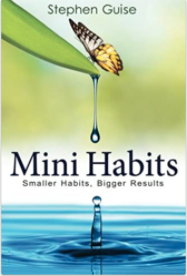“What’s better than goals” is a good question? After all, it’s coming up to 2024 (currently Dec 28th 2023 as I write) and it’s the time for New Years Resolutions! Those commitments are seldom kept though. By March most have stopped going to the gym and their lives haven’t changed much. But why is that? The main reason is that the little daily habits you’ve built up over decades are moving in greater momentum than the new ones you’re trying to replace them with.

So you join the gym with good intentions but alas, you haven’t built up the momentum yet. To get to the point of habit, you need to overcome the inertia of your past habits. That is, not going to the gym, eating whatever you want and slobbing out instead of working out. To get into a good habit of going (to the gym) takes consistent steps over a long enough duration for the action to become habitual.
When it does, it feels wrong not to go. The problem is most people don’t stick with their new goals and most drop out. Gyms know this of course which is why they charge a monthly subscription. Once you’re tied in financially, it provides an incentive to maintain the membership, even though you don’t go anymore! By March, your membership becomes a token of your gesture to get in shape and before long you cancel!
What’s Better Than Goals? Micro Commitments/Mini Habits
Micro commitments or systems of behaviour are better than goals for a couple of good reasons. The problem with goals is that you can change your mind when faced with the actual actions you need to take on a regular basis. You think about the goal and decide (in the moment) that it’s not so important after all! With a micro commitment, your focus is on building a new behaviour, not attaining a specific long term goal. These are also known as Mini Habits or Micro Habits. There’s a few great books on this topic: Mini Habits: Stephen Guise, Atomic Habits: James Clear and The Slight Edge: Jeff Olson.

A mini habit is such a small commitment to your long term goal that it’s a no brainer to do it. An example from Stephen Guise’s book Mini Habits is a single push up a day. A single push up is something pretty much anyone can do. Plus, it’s far easier to do it than to go to the gym. You can do it from anywhere (you can do one now!). Once you’ve done your pushup, you’re off the hook for the day. The simplicity of a micro habit is that it gets you to use the power of inertia. Once you’re on the ground doing your push up, you’re much more likely to do two, or three.
Why Goals Fail
Goals fail because when we are in the mood for writing goals we give ourselves a hard task, since we’re inspired. In the right mindset, we can set ourselves some pretty tough objectives, because we’re feeling strong. But when you’re hung over, tired or grumpy, how are you going to feel about doing the 30 minutes on the treadmill you have promised to yourself? Or the 30 minutes of weightlifting? When the inertia of old habits and behaviours meets your new “designated goal” on a bad day, you’re unlikely to carry out the new habit; especially if you haven’t built up momentum with it.

With a micro/mini habit, the objective is to set yourself a ridiculously easy task you can do every single day, no matter what your state of mind is.
A mini habit can apply to any type of goal whether it is to do with your health, business, relationships or something else. A single push up, a blog post or a phone call are all examples of a mini habit which you can apply to your life. By applying this strategy and making your mini habit easy, you establish a new behaviour. Once it’s become ingrained and you can maintain it for long enough it becomes an automatic behaviour.
Behaviours are much more powerful than goals. Brushing your teeth, taking the bins out, washing the dishes. These are the kinds of things which get done no matter what. So no matter how much of a bad day you’re having, you do the behaviour. Over time it becomes powerful because you can add to it, little by little.
The Power Of Inertia
The long term idea of mini habits isn’t that those mini habits will make a massive different immediately. They probably won’t. After all, how much is one press up going to do? The power of a mini habit is in the long term power of inertia in creating the outcome you truly desire. So for example, if your long term goal is to get in shape, a mini habit would help you install a new habit of doing a press up/push up every single day.

Once that habit is installed, and you’ve been doing it for long enough, you won’t feel right unless you do it. At this point you can add to the habit, now that it has been successfully installed. Some days you’ll want to do more than one push up, if you’re feeling good. The bad days you can just do the one, and it’s ok, you’re off the hook for that day!
Over time, you can use your new behaviour to set new behaviours around it. For example, after a month of doing your one push up, you might find you’re doing 10 a day, rather than just one. Now add a sit up to it, just one per day too.
Summary
It’s easy to write out some lofty goals, only to drop them when you’re struggling with a hang over or having a bad day. It’s far easier to install micro habits which require only a tiny commitment each day, than to struggle with a lofty commitment you’ve made beforehand (when you were feeling positive).
Will power is finite and will let you down when your old habits meet your new plans on a bad day. Create tiny micro commitments instead. This will give you more opportunity to shift your mindset over time. You’re less likely to fail when you’re not feeling like it because your mini habit is ridiculously easy. On a good day, you can over perform. On a bad day, simply meet your minimum requirement, whatever that might be.
Give yourself at least 30 days of your new mini habit before changing it. You can add to the action (in terms of repetition), but you mustn’t fall off the daily routine. If you do, consider using a smaller habit which you can sustain over the longer term.
See also the power of micro habits.